九年级英语 第三单元 · 教案 ·(全)·
- 格式:doc
- 大小:95.13 KB
- 文档页数:14
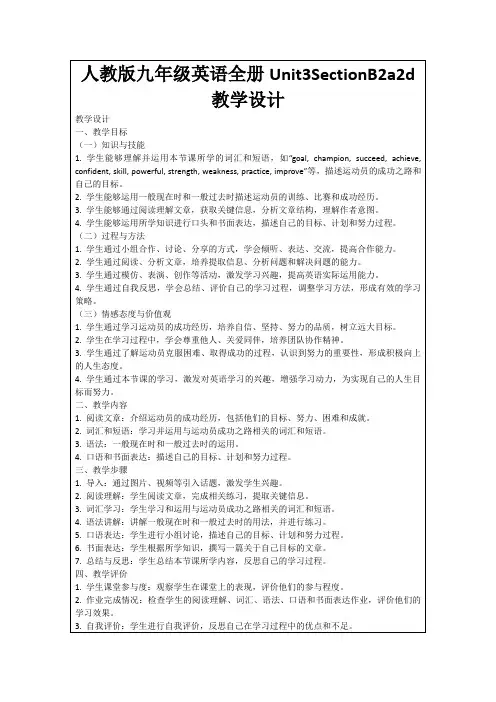
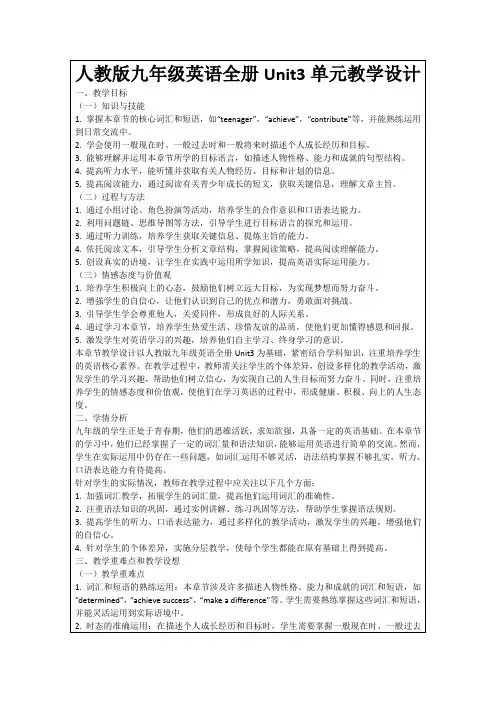
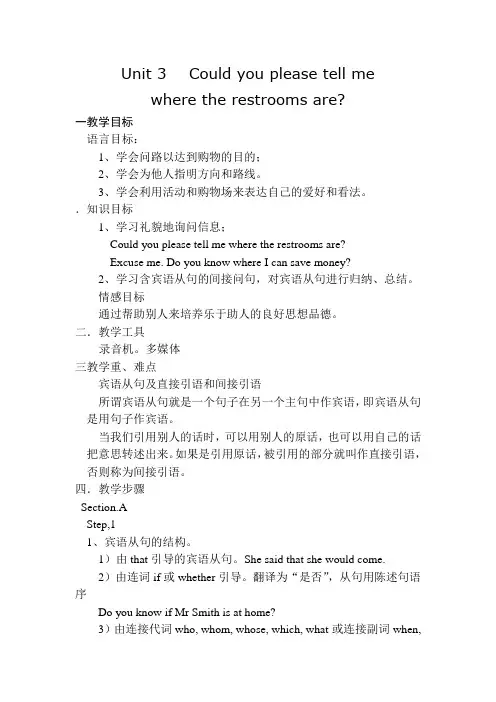
Unit 3 Could you please tell mewhere the restrooms are?一教学目标语言目标:1、学会问路以达到购物的目的;2、学会为他人指明方向和路线。
3、学会利用活动和购物场来表达自己的爱好和看法。
.知识目标1、学习礼貌地询问信息;Could you please tell me where the restrooms are?Excuse me. Do you know where I can save money?2、学习含宾语从句的间接问句,对宾语从句进行归纳、总结。
情感目标通过帮助别人来培养乐于助人的良好思想品德。
二.教学工具录音机。
多媒体三教学重、难点宾语从句及直接引语和间接引语所谓宾语从句就是一个句子在另一个主句中作宾语,即宾语从句是用句子作宾语。
当我们引用别人的话时,可以用别人的原话,也可以用自己的话把意思转述出来。
如果是引用原话,被引用的部分就叫作直接引语,否则称为间接引语。
四.教学步骤Section.AStep,11、宾语从句的结构。
1)由that引导的宾语从句。
She said that she would come.2)由连词if或whether引导。
翻译为“是否”,从句用陈述句语序Do you know if Mr Smith is at home?3)由连接代词who, whom, whose, which, what或连接副词when,where, how, why等引导。
从句用陈述句语序。
Do you know who broke the window?I don’t know when I shall finish4)某些形容词之后的从句有时也被看作是宾语从句。
如:afraid, wure, sorry, glad, worried, angry, confident.I’m sorry that I’m late again.They were angry that they had lost the chance.2、宾语从句的时态一致主句是过去时,宾语从句要用过去时态;主句是现在时或将来时,宾语从句则该用什么时态就用什么时态。
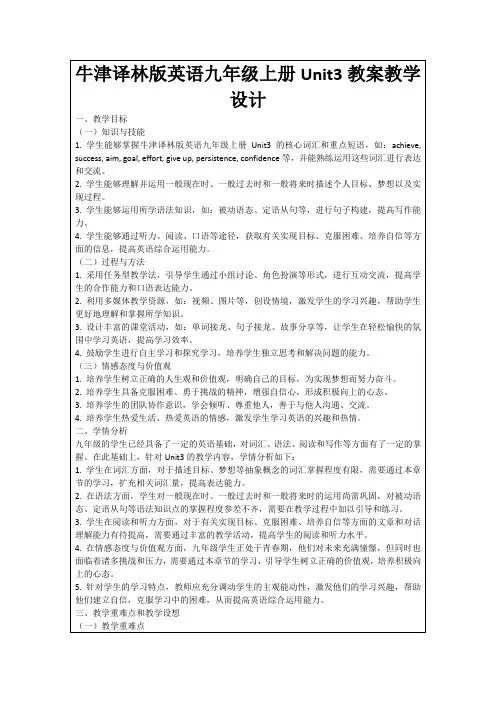
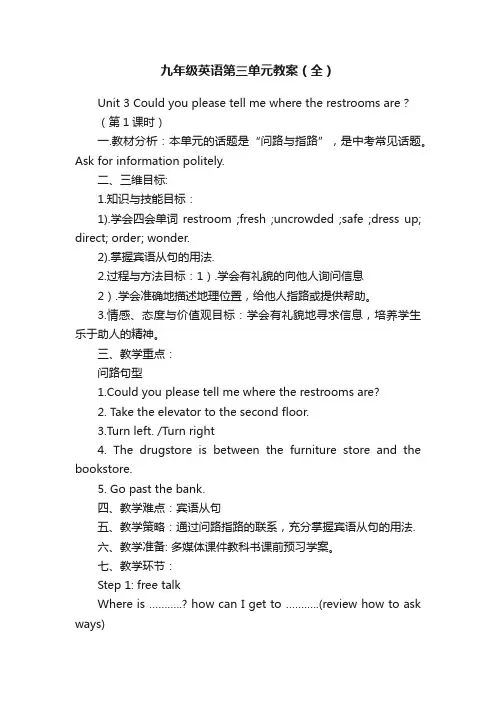
九年级英语第三单元教案(全)Unit 3 Could you please tell me where the restrooms are?(第1课时)一.教材分析:本单元的话题是“问路与指路”,是中考常见话题。
Ask for information politely.二、三维目标:1.知识与技能目标:1).学会四会单词restroom ;fresh ;uncrowded ;safe ;dress up; direct; order; wonder.2).掌握宾语从句的用法.2.过程与方法目标:1).学会有礼貌的向他人询问信息2).学会准确地描述地理位置,给他人指路或提供帮助。
3.情感、态度与价值观目标:学会有礼貌地寻求信息,培养学生乐于助人的精神。
三、教学重点:问路句型1.Could you please tell me where the restrooms are?2. Take the elevator to the second floor.3.Turn left. /Turn right4. The drugstore is between the furniture store and the bookstore.5. Go past the bank.四、教学难点:宾语从句五、教学策略:通过问路指路的联系,充分掌握宾语从句的用法.六、教学准备: 多媒体课件教科书课前预习学案。
七、教学环节:Step 1: free talkWhere is ………..? how can I get to ………..(review how to ask ways)小组讨论Step 2 1aI do exercisesII check the answers and translateIII try to rememberStep 3 listening1bI . Read the instructions to students. Point out the two conversations that are shownin the picture.II. fill in the blanks with the words you hear.III. Check the answers. (show the picture)2a / 2bI Point out the picture. (show the picture)II do exercisesIII Check the answers.Step 4 work in pairs.Make conversations using the following places in the picture.。
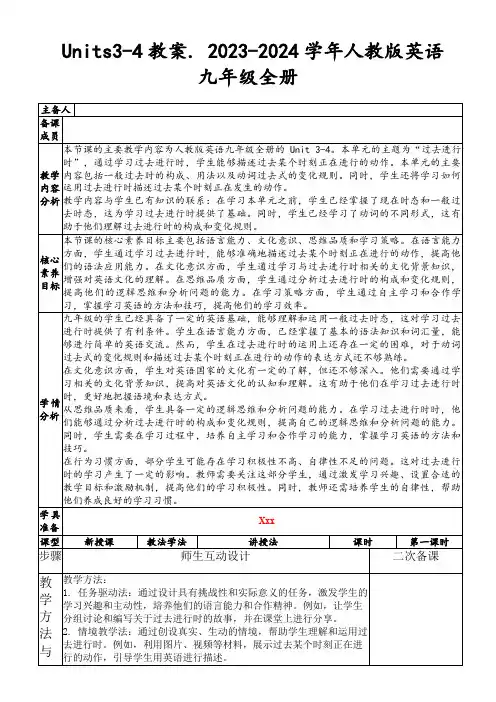
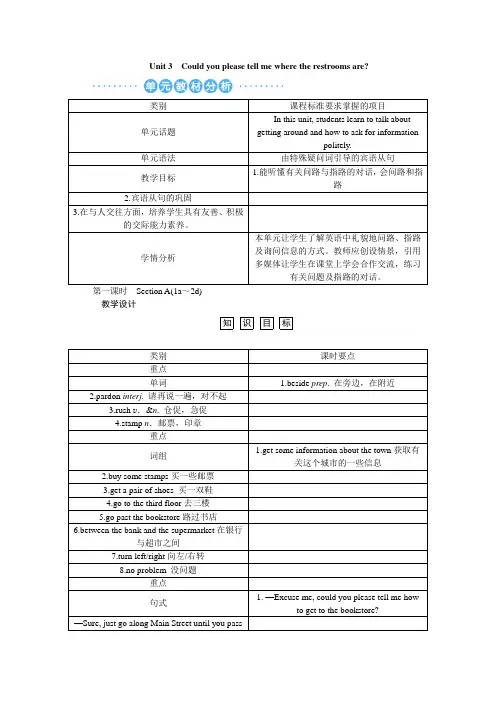
Unit 3Could you please tell me where the restrooms are?教学设计知识目标课堂环节§自主学习案翻译下列词组。
1.买一些邮票buy__some__stamps2.得到关于……的信息get__some__information__about…3.打扰了excuse__me4.向左/右转turn__left/right5.经过书店go__past__the__bookstore6.在……和……之间between__…__and__…7.在左/右边on__the__left/right8.在那边over__there9.在二楼on__the__second__floor10.买一双鞋get__a__pair__of__shoes§课堂导学案Step 1 准备与热身(Preparation)Show pictures to the whole class, one student explains the places in English and another one who doesn't look at the blackboard guesses what place it is.For example, one student says: We can save money or exchange money in this place, another one guesses it is a bank.Get students to guesses the places like bank, post office, bookstore, museum, bathroom, washroom, mall and so on.T: You're new to this school.You need to know where the main office is.How can you ask where the main office is?S: Where's the main office?T: That's one way to ask.But there is a more polite way you can ask.Can you say some of them ?Students:__________________① Can you tell me where Classroom 1 is?② Could you tell me how to get to Classroom 1?……Step 2 呈现与输入(Presentation)1.要求学生翻开课本P17,要求学生查看1a下方的图片并与方框中所给动词短语的描述搭配起来。
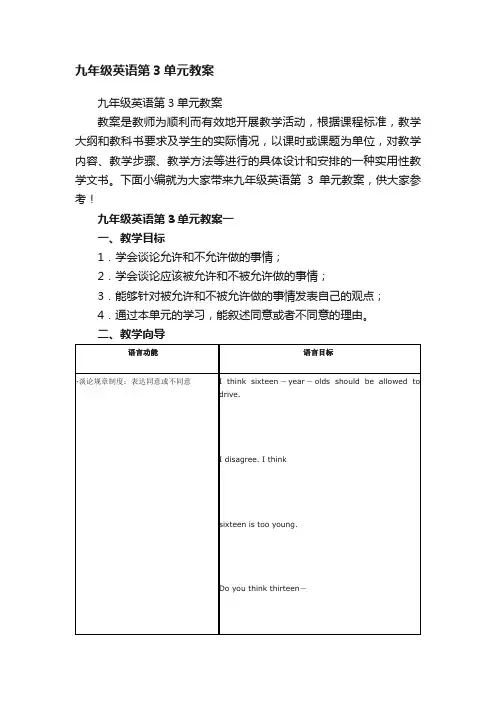
九年级英语第3单元教案九年级英语第3单元教案教案是教师为顺利而有效地开展教学活动,根据课程标准,教学大纲和教科书要求及学生的实际情况,以课时或课题为单位,对教学内容、教学步骤、教学方法等进行的具体设计和安排的一种实用性教学文书。
下面小编就为大家带来九年级英语第3单元教案,供大家参考!九年级英语第3单元教案一一、教学目标1.学会谈论允许和不允许做的事情;2.学会谈论应该被允许和不被允许做的事情;3.能够针对被允许和不被允许做的事情发表自己的观点;4.通过本单元的学习,能叙述同意或者不同意的理由。
二、教学向导三、主题词表四、主题思维图及任务型活动任务一:勇敢的男孩在生活中我们通常会碰到不少的困难,要想当一个勇敢的男孩,应该怎么做,又应该允许他做什么呢。
任务二:可爱的女孩怎么做才能当一个可爱的女孩呢?请大家谈谈我们心目中的可爱女孩吧。
任务三:模范的公民要想当一名模范的公民,他应该怎么做,又不该做什么呢?你想当一名模范的公民吗?你认为一名模范的公民应该有什么样的权利和义务呢?五、可供教师选择的任务活动Sample l我的家规此活动为小组活动,要求同学谈论自己在家里允许做的事情和不允许做的事情,并讨论哪些事情应该是允许做的,哪些是不允许做的。
目的是使学生学会表达被允许做的事情和不被允许做的事情,并学会表达应该被允许做的事情和不被允许做的事情,使学生增强遵守规定的意识。
Teacher: Different families have different rules at home. Please tell your group members what you should do or shouldn’t do at home. Then tell them what you are allowed to do or not allowed to do at home.操作建议:1.以四人为一组开展此项活动。
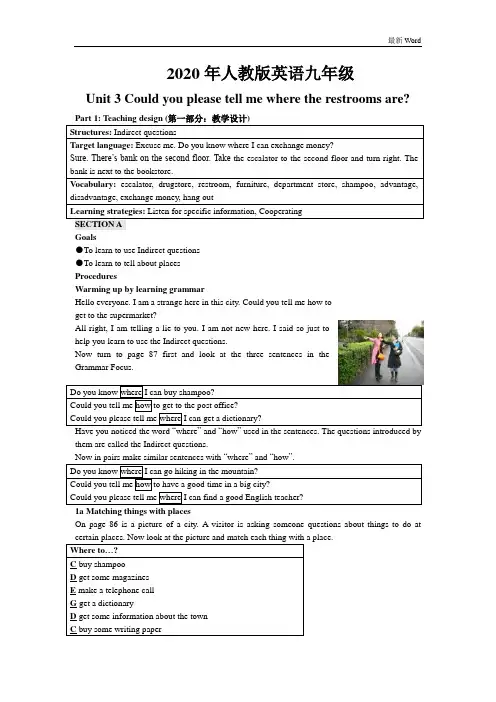
2020年人教版英语九年级Unit 3 Could you please tell me where the restrooms are?Goals●To learn to use Indirect questions ●To learn to tell about places ProceduresWarming up by learning grammarHello everyone. I am a strange here in this city. Could you tell me how to get to the supermarket?All right, I am telling a lie to you. I am not new here. I said so just to help you learn to use the Indirect questions.Now turn to page 87 first and look at the three sentences in the Grammar Focus.Have you noticed the word “where ” and “how ” used in the sentences. The questions introduced by them are called the Indirect questions.1a Matching things with placesOn page 86 is a picture of a city. A visitor is asking someone questions about things to do atE buy some stampsB save money1b Listening and completingIt is difficult to get around in a new place. Now listen to the recording and complete the dialogue in the picture on page 86.TapescriptConversation 1Girl1: Excuse me. Could you tell me where I can buy some stamps?Boy1: Yes. There’s a post office on Center Street.Girl1: Oh. Can you tell me where Center Street is?Boy1: Sure. Go past the bank. Center Street is on your right.Girl1: Thanks a lot.Boy1: No problem.Conversation 2Girl2: Excuse me. Do you know where I can save money?Boy2: Sure. There’s a bank on Main Street.Girl2: Oh. Could you please tell me how to get there?Boy2: Yes... Go straight ahead. The bank is on your left.Girl2: Thank you.Boy2: You’re welcome.Write your words here in the speech bubbles.A: Could you tell me where I can buy some stamps?B: Yes. There’s a post office on Center Street.A: Excuse me. Do you know where I can save money?B: Sure. There’s a bank on Main Street.Read the tapescript and try to underline all the useful expressions used and circle the Indirect questions.1c Doing pairworkIn 1a there are many phrases describing activities. Now use them to make up conversations to talk about your own city. (The Indirect questions are circled.)A: Excuse me. Can you please tell me where I can buy shampoo in this city?B: Sure. There’s a department store over there.A: Excuse me. Can you please tell me where I can get some magazines?B: Sure. There’s a post office around the corner.A: Excuse me. Can you please tell me where I can make a telephone call?B: Sure. There’s a post office one hundred meters down the street.A: Excuse me. Can you please tell me where I can get some information about the town?B: Sure. There’s a library opposite of the hospital.A: Excuse me. Can you please tell me where I can get some writing paper?B: Sure. There’s a department store close to the bus station.A: Excuse me. Can you please tell me where I can buy some stamps?B: Sure. There’s a post office beside the library over there.A: Excuse me. Can you please tell me where I can save money.B: Sure. There’s a big bank beside the café on the main library over there.2a Listening and numberingDo you like shopping? If you do come and listen to the directions for going shopping around a new city.TapescriptBoy1:Excuse me. Can you tell me where I can buy some shampoo?Boy2:Yes. There’s a drug store on the second floor. Um. Let me think... Take the escalator to the second floor and then... then you turn left. Let’s see...Then go past the bank. And um... The drug store is between the furniture store and the bookstore. You should be able to get shampoo there.Boy1:OK, great. Thanks a lot.Boy2:You’re welcome.While listening please number the directions in the order that you hear them.Take the elevator to the second floor.2 Turn left.1 Take the escalator to the second floor.Turn right.4 The drugstore is between the furniture store and the bookstore.3 Go past the bank.Read the tapescript for the Indirect questions and the useful expressions. Circle the Indirect questions and underline the useful expressions.2b Listening and drawingDo you like drawing. Now listen to the recording again to draw a line on the picture on page 87 to show how the boy walks to the drugstore.2c Doing pairworkWhat else do like to buy? Then make conversations in pairs using the otherplaces in the picture on page 87.A: Excuse me. Do you know where I can exchange money?B:Sure. There’s a bank on the second floor. Take the escalator to the second floor and turn right. The bank is next to the bookstore.A: Excuse me. Do you know where I can buy music CD?B:Sure. There’s a Music Magic shop on the first floor. Don’t take the escalator. It is next to the escalator room.A: Excuse me. Do you know where I can get a dictionary?B:Sure. There’s a bookstore on the second floor. Take the escalator to the second floor and turn right. The bookstore is next to the bank.A: Excuse me. Do you know where I can buy some candies?B:Sure. There’s a drugstore on the second floor. Take the escalator to the second floor and turn right. The bank is next to the bookstore.A:Excuse me. Do you know where I can buy a desk?B:Sure. There’s a furniture store on the second floor. Take the escalator to the second floor and turn right. The bank is next to the drugstore.Now read aloud the conversations again to Circle the Indirect questions and underline the useful expressions.3a Reading and listingOn page 88 is an article about going to a mall. Now read it to list the advantages and disadvantages of going to a mall. While you read, Circle the Indirect questions and underline the useful expressions.They’re all at the mall.After school, a lot of young people go to the mall. We decidedto talk to some students about why they go there.Interviewer: Why do you go to the mall?Yu Yue: I go to the mall because my friends hang out there. But I don’t really like it.Interviewer: Oh? Why not?Yu Yue: The air isn’t fresh. I prefer being outside. Also, it’s usually crowded.Interviewer: And how about you?Li Jun: Oh, I love the mall. There’s always something happening. There are a lot of free concerts there. It’s also just fun to watch people.Hu Peng: I like the mall, too. I like to go in the music store and listen to CDs. I also like to look at books in the bookstore.Yu Yue: Well, when I go into stores I always spend too much money!Advantages disadvantagesThere’s always something happening.The air isn’t fre sh.There are a lot of free concerts there. It’s usually crowded.It’s also just fun to watch people.when I go into stores I always spend too muchmoney!I like to go in the music store and listen to CDs.I like to look at books in the bookstore.3b Doing groupworkWhere do you usually hang out with friends? What are the advantages and disadvantages of hanging out at your house, at a mall or at your school? Now in groups talk about them.A: Where do you usually hang out with your friends?B: We usu ally go to my friend, Qiu’s place.A: Is that a good place to hang out?B:Well, it has advantages and disadvantages. It’s kind of small. But Qiu’s mom is a wonderful cook, so we always have great snacks.A: Where do you usually hang out with your friends?B: We usually go to the bookstore.A: Is that a good place to hang out?B:Well, it has advantages and disadvantages. It’s very big and the air is fresh,too. And we can just read books there. We don’t have to buy books. So wealways have a good time there.A: Where do you usually hang out with your friends at weekends?B: I usually stay at home.A: Is that a good place to hang out for the weekends?B: Well, it has advantages and disadvantages. My room is kind of small. But I have a computer there. I go online reading and watching. It is a wonderful place. So I always hang in at home.4. Directions challengeNow we are going to challenge one another. Write directions from your school to three certain places. Read the directions to each other and guess the places.A: Go out the front door and take a right. Walk about three blocks. Go past the park, and turn left onto Oak Street. Then it is the…?B: Then it is the bookstore.A: Go out the back door and take a left. Walk about two blocks. Go past the post office, and turn right onto Chang’an Street. Then it is the…?B: Then it is the Teachers College.A: Go out the side door and take a right. Walk about three blocks. Go past the bus station, and turn left onto Flag Street. Then it is the…?B: Then it is the lake.Closing down by looking and sayingTo bring the period to an end let’s look at the picture and talk about things happening in it.SECTION BGoalsTo learn to talk about places in the cityTo learn to read about placesProceduresWarming up by thinking about How to ask for directions when travelingBEST PROCEDURE:◆Get the name and address of the place you wish to visit.◆Talk to the Hotel Manager or someone that can read and write. If they get weak looking, or they hesitate to read, do not embarrass them, go to the next person. The probably cannot read.◆After you have found hopefully someone that speaks your language or English you can start to ask questions...1a Putting wordsOn page 89 is a list of words and a box with places. Now go over them and put in words besidethe place, the most important quality words first.Places Qualities1. restroom Clean→safe→uncrowded2. museum Fascinating→interesting→beautiful3. restaurant Delicious→uncrowded→inexpensive4. park Big→interesting→clean5. subway Convenient→safe→6. mall Uncrowded→inexpensive→1b Doing pairworkYou are familiar with the words in 1a. Now use them to talk about your city.A: The Fine Arts Museum is really interesting.B:Yes, and it’s beautiful, too.A: The Computer Room is really big.B:Yes, and it’s convenient, too.A: The Dining Hall is really clean.B: Yes, and the food is cheep, too.A: The Bus Station is really safe.B:Yes, and it’s uncrowded, too.A: The Central Square is really fascinating.B: Yes, and it’s not far away, either.2a Listening and writingSome tourists are going around your city. They are asking about things. Now listen to them talking and write what they ask about.Conversation 1Boy1: Could you tell me where there’s a good place to eat?Clerk:Of course. There are a lot of good restaurants in Sunville. What kind of food are you looking for?Boy:Vegetarian.Clerk:I’d try Green Land. They have delicious salads.Conversation 2Girl: Do you know if there are any public restrooms around here?Clerk: Yes. You’ll find some at the corner of Market and Middle Streets.Girl: Ummm... are they clean?Clerk: Oh, yes. They’re very clean.Conversation 3Mother: Could you tell me if there is a good museum in Sunville?Clerk:Well, we have several. What kind of museums do you like—history? Science? A children’s museum?Father: How about history? I like history museums. They’re fascinating.Girl1: Oh, Dad! History museums are boring. Let’s go to a science museum.Boy2: Science? We always go to science museums. I don’t like science museums. I want to go to a children’s museum. They’re more fun.Girl2: Well I’m too old for a children’s museum. Why don’t we go to an art museum?Clerk:Why don’t you go to the computer museum? There are a lot of fun things for childrenthere. You can learn all about the history of computers, as well as learn about science. Family: That’s a great idea! Let’s go to the computer museum. How do we get there?Do you know what the tourists are asking about?The tourists ask about…Conversation 1 RestaurantsConversation 2 public restroomsConversation 3 a good museum2b Listening and writingNow you are to listen to the conversations for the second time. Listen for where the man says the tourists should go.The tourists should go to…Conversation 1 Green LandConversation 2 The corner of Market and Middle StreetsConversation 3 The computer museumTo make a better use of the listening exercise we shall go on to read the tapescripts. While you read, Circle the Indirect questions and underline the useful expressions.2c Doing pairworkFor fun and for learning let’s role play the conversations between the man and the tourists. Who will be the man? All right, it’s you, Zhao Hongtao.A:Can you tell me where there’s a good place to eat?B: Of course. What kind of food do you like?A: I like vegetarian food.B: There are a lot of good restaurants in Sunville. Why not go to GreenLand. They have delicious salads.A: Can you tell me if there are any public restrooms around here?B: Yes, there’s one at the corner of Market and Middle Streets.A: A re they clean?B: Oh, no. They’re very dirty.A: Could you tell me if there is a good museum in Sunville?B:There’s a computer museum at the corner? There are a lot of fun things for both children and parents.A: That’s a great place! Let’s go to the computer museum. How do we get there?B: Take Bus 11.3a Reading and fillingGo to page 90, please. Read the article on the left and fill in the charts on the right. While reading try to underline all the useful expressions and circle all the connectivesEat, have fun and learn in Watertown!Watertown is a great place for the family to take a vacation.Teenagers will want to visit the world’s largest water slides and eat at Uncle Bob’s. A different rock band plays at Uncle Bob’s every night. Kids will enjoy the Clown City Café. They have organized games and the staff dress up as clowns.There’s also a lot for parents in Watertown. If they love good food, they can find it at the Farmer’s Market where the food is both delicious and cheap. While the children have fun, parents can take the dance lessons on the beach. And everyone can learn something in Watertown. There are threemuseums!Teenagers love the Sports Museum and kids enjoy the Science Museum. Parents will spend many happy hours walking through the History Museum.After reading fill in the chart on page 90 on the right.Kids Teenagers ParentsEat Uncle Bob’s Farmer’s MarketHave fun Clown City CaféWater slides Dance lessonsLearn Science Museum Sports Museum History Museum3b Completing a tour guideOn page 90 is an unfinished tour guide to Sunville. Now turn back to 2a and 2b for information to finish it.SUNVILLE has something for everyone. If you’re looking for museums,you will find several here. History museums are fascinating to parents.But kids may find them boring. In a science museum you can learn lots ofthings. Children’s museums are more fun. An art museum is interesting topeople who like arts. If you go to the computer museum you will find alot of fun things for children there. They can learn all about the history ofcomputers, as well as learn about science.IN SUNVILLE there are a lot of good restaurants, too. They are nice places to eat. You can find vegetarian food and meats, too. Green Landoffers delicious salads.Public restrooms around SUNVILLE are clean and beautiful. You’ll find some easily at the corner of Market and Middle Streets.3c Write a guide to your city or townMY HOMETOWN: TAIYUANTaiyuan, the capital city of Shanxi Province, lies in the north basin of Middle Jin (Jin is another name for Shanxi Province) and crosses the River Fen. The city area administers three districts, one subdivided city and five counties. The history of the city can be traced back to over 2,400 years ago. It was established in 497 BC, the end of the Spring and Autumn Period (the slavery Period in China) and was named Jinyang, the northern bank of the Jin River. In Chinese, the northern bank of waters is called yang. In 982, Song Taizong, Zhao Kuangyi, the second emperor of the Song Dynasty burned and flooded Jinyuan City. After that, he ordered one of the officials, Pan Mei to build Taiyuan City in Tangming Town, north of Jinyuan City. Thus, came the present Taiyuan City. Taiyuan, in Chinese, means the greatest plain. In fact, it is dominated by rugged hills and hilly areas. Only one-fifth of the whole area is plains. Taiyuan is surrounded by mountains in the east, west and north; only the southern part is alluvial plains. Taiyuan abounds in various minerals, especially coal and iron, so honors the name, "the home of coal and iron." Taiyuan is of continental climate at temperate zone. It is dry and cold in winter, hot and rainy in summer, dusty and windy in spring, cool and comfortable in autumn. The annual averagetemperature is 9.5 Degree Celcius.4 Doing groupworkOne of the group member is to role play the information booth worker, and theothers are the tourists. The tourists are asking about your city.Tourist: What is Taiyuan?Information booth worker: It is the capital city of Shanxi Province.Tourist: Where is Taiyuan?Information booth worker: It lies in the north basin of Middle Jin (Jin is another name for Shanxi Province) and crosses the River Fen.Tourist: How many districts are there in Taiyuan?Information booth worker: The city area administers three districts, one subdivided city and five counties.Tourist: How old is the city?Information booth worker: The history of the city is as old as 2,400 years. It was established in 497 BC, the end of the Spring and Autumn Period (the slavery Period in China). What was its old name?Tourist:Information booth worker: It was named Jinyang, the northern bank of the Jin River. In Chinese, the northern bank of waters is called yang.…Closing down by going around TaiyuanAt the end of the period I will take you on a trip to Taiyuan. Come with me.SELF CHECK2. Looking and writingThere is a map on page 91 in the middle. Look at it and ask five questions. Answer them as a local person might do.1.Excuse me, could you tell me where the bank is?→It’s between the Fifth Avenuet and theGarden Road on the west side of the Central Street.2.Excuse me, could you tell me where the movie theatre is?→It’s at the corner of the FifthAvenue and the Central Street. You can find it on your right.3.Excuse me, could you tell me where the restaurant is?→There are three restaurants in thecity. The best one is n earest from here. It’s between the Fifth Avenue and the Road, just by the Central Street.4.Excuse me, could you tell me where the library is?→It’s at the west end of the Garden Roadopposite to the best restaurant in the city.5.Excuse me, could you tell me where the shopping mall is?→It’s the tallest building in the city.It’s located west of the Central Street between the Fifth Avenue and the Garden Road.Just for fun!Reading poems is fun. So go on reading this little poem by James Whitcomb Riley (1849-1916).A BOY'S MOTHERMY mother she's so good to me,Ef I was good as I could be,I couldn't be as good—no, sir!—Can't any boy be good as her!She loves me when I'm glad er sad;She loves me when I'm good er bad;An', what's a funniest thing, she saysShe loves me when she punishes.I don't like her to punish me.—That don't hurt,—but it hurts to seeHer cryin'.—Nen I cry; an' nenWe both cry an' be good again.She loves me when she cuts an' sewsMy little cloak an' Sund'y clothes;An' when my Pa comes home to tea,She loves him most as much as me.She laughs an' tells him all I said,An' grabs me up an' pats my head;An' I hug her, an' hug my PaAn' love him purt' nigh as much as as Ma.Reading: Could you please lend me your pen?Before you read, listen to the recording for the general idea of the passage.While you read, underline all the expressions and circle all the connectives.Asking for information or help is a very common and necessary activity, especially when we visit a foreign country, so knowing how to ask for information politely is important. In English,the restrooms are?” are similar requests —but the first could sound rude. It’s important to use correctlanguage, but sometimes this alone is not enough—make requests.me, Mr West. Do you k now where my book is?”, your question will sound much more polite. On the other hand, it might be all right to say “Where is my book?” in some situations, perhaps with peopleyou know well.And you would not usually say, “Peter, lend me your pen.” A very direct order like this can sound最新Wordrude in English. Usually in English polite questions are longer and include extra language such as ‘Could you please…?’ or ‘Can I ask…?’ It sounds more polite to say, “Peter, could you please lend me your pen?” Sometime s, we might even need to spend some time leading in to a question or request. For example, if you stop a stranger in the street, we might first say, “Excuse me, I wonderIt might seem that speaking politely is more difficult than being direct, and in a way this may be true. However, in order not to offend people, learning about language etiquette is just as learning grammar or vocabulary. And doing this will also help you become better at English, or any otherPart 2: Teaching Resources (第二部分:教学资源)I. How to ask for directionsWhen you don't know where you are, or when you don't knowhow to get to a place, you can ask directions. Talk to the firstperson that you see. Ask that person where you should go.I don't like maps. I prefer to just stop and ask directions.I think we're lost. Let's pull over and ask directions.。
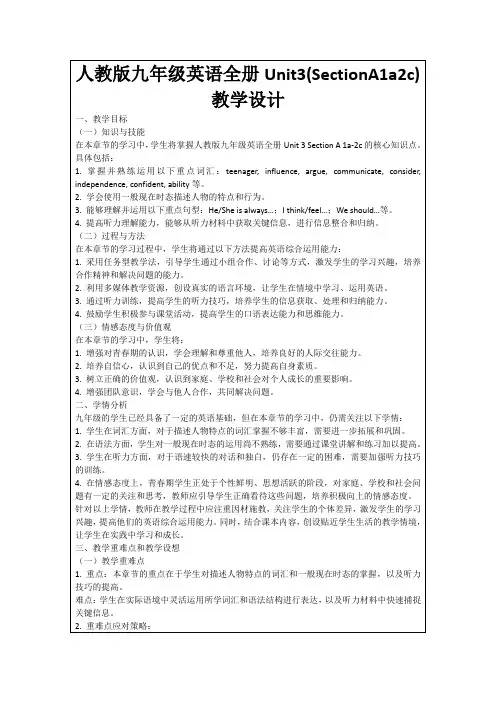
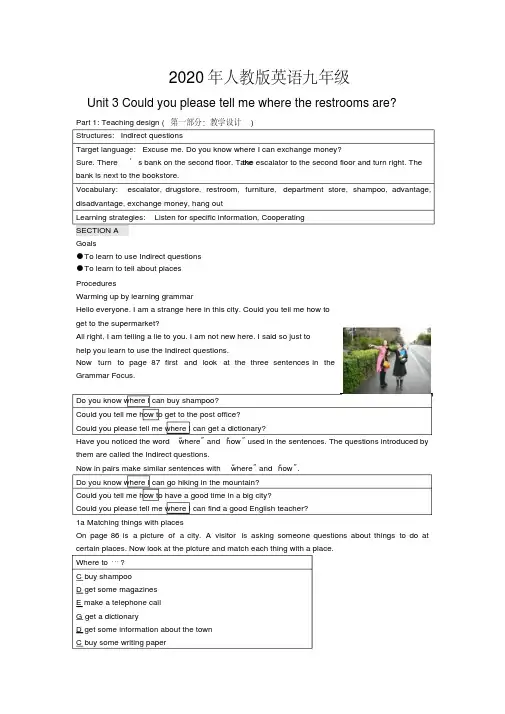
2020年人教版英语九年级Unit 3 Could you please tell me where the restrooms are?Part 1: Teaching design (第一部分:教学设计)Structures: Indirect questionsTarget language: Excuse me. Do you know where I can exchange money?Sure. There’s bank on the second floor. Takethe escalator to the second floor and turn right. The bank is next to the bookstore.Vocabulary: escalator, drugstore, restroom, furniture, department store, shampoo, advantage, disadvantage, exchange money, hang outLearning strategies: Listen for specific information, CooperatingSECTION AGoals●To learn to use Indirect questions●To learn to tell about placesProceduresWarming up by learning grammarHello everyone. I am a strange here in this city. Could you tell me how toget to the supermarket?All right, I am telling a lie to you. I am not new here. I said so just tohelp you learn to use the Indirect questions.Now turn to page 87 first and look at the three sentences in theGrammar Focus.Do you know where I can buy shampoo?Could you tell me how to get to the post office?Could you please tell me where I can get a dictionary?Have you noticed the word “where” and “how” used in the sentences. The questions introduced by them are called the Indirect questions.Now in pairs make similar sentences with “where” and “how”.Do you know where I can go hiking in the mountain?Could you tell me how to have a good time in a big city?Could you please tell me where I can find a good English teacher?1a Matching things with placesOn page 86 is a picture of a city. A visitor is asking someone questions about things to do at certain places. Now look at the picture and match each thing with a place.Where to…?C buy shampooD get some magazinesE make a telephone callG get a dictionaryD get some information about the townC buy some writing paperE buy some stampsB save money1b Listening and completingIt is difficult to get around in a new place. Now listen to the recording and complete the dialoguein the picture on page 86.TapescriptConversation 1Girl1: Excuse me. Could you tell me where I can buy some stamps?Boy1: Yes. There’s a post office on Center Street.Girl1: Oh. Can you tell me where Center Street is?Boy1: Sure. Go past the bank. Center Street is on your right.Girl1: Thanks a lot.Boy1: No problem.Conversation 2Girl2: Excuse me. Do you know where I can save money?Boy2: Sure. There’s a bank on Main Street.Girl2: Oh. Could you please tell me how to get there?Boy2: Yes... Go straight ahead. The bank is on your left.Girl2: Thank you.Boy2: You’re welcome.Write your words here in the speech bubbles.A: Could you tell me where I can buy some stamps?B: Yes. There’s a post office on Center Street.A: Excuse me. Do you know where I can save money?B: Sure. There’s a bank on Main Street.Read the tapescript and try to underline all the useful expressions used and circle the Indirect questions.1c Doing pairworkIn 1a there are many phrases describing activities. Now use them to make up conversations to talk about your own city. (The Indirect questions are circled.)A: Excuse me. Can you please tell me where I can buy shampoo in this city?B: Sure. There’s a department store over there.A: Excuse me. Can you please tell me where I can get some magazines?B: Sure. There’s a post office around the corner.A: Excuse me. Can you please tell me where I can make a telephone call?B: Sure. There’s a post office one hundred meters down the street.A: Excuse me. Can you please tell me where I can get some information about the town?B: Sure. There’s a library opposite of the hospital.A: Excuse me. Can you please tell me where I can get some writing paper?B: Sure. There’s a department store close to the bus station.A: Excuse me. Can you please tell me where I can buy some stamps?B: Sure. There’s a post office beside the library over there.A: Excuse me. Can you please tell me where I can save money.on the main library over there.B: Sure. There’s a big bank beside the café2a Listening and numberingDo you like shopping? If you do come and listen to the directions for going shopping around anew city.TapescriptBoy1:Excuse me. Can you tell me where I can buy some shampoo?Boy2:Yes. There’s a drug store on the second floor. Um. Let me think... Take the escalator to the second floor and then... then you turn left. Let’s see...Then go past the bank. And um... The drug store is between the furniture store and the bookstore. You should be able to get shampoo there.Boy1:OK, great. Thanks a lot.Boy2:You’re welcome.While listening please number the directions in the order that you hear them.Take the elevator to the second floor.2 Turn left.1 Take the escalator to the second floor.Turn right.4 The drugstore is between the furniture store and the bookstore.3 Go past the bank.Read the tapescript for the Indirect questions and the useful expressions. Circle the Indirect questions and underline the useful expressions.2b Listening and drawingDo you like drawing. Now listen to the recording again to draw a line on the picture on page 87 to show how the boy walks to the drugstore.2c Doing pairworkWhat else do like to buy? Then make conversations in pairs using the otherplaces in the picture on page 87.A: Excuse me. Do you know where I can exchange money?a bank on the second floor. Take the escalator to the second floor and turn right. B:Sure. There’sThe bank is next to the bookstore.A: Excuse me. Do you know where I can buy music CD?s a Music Magic shop on the first floor. Don’ttake the escalator. It is next to the B:Sure. There’escalator room.A: Excuse me. Do you know where I can get a dictionary?a bookstore on the second floor. Take the escalator to the second floor and turn B:Sure. There’sright. The bookstore is next to the bank.A: Excuse me. Do you know where I can buy some candies?B:Sure. There’s a drugstore on the second floor. Take the escalatorto the second floor and turn right. The bank is next to the bookstore.A:Excuse me. Do you know where I can buy a desk?a furniture store on the second floor. Take the escalator toB:Sure. There’sthe second floor and turn right. The bank is next to the drugstore.Now read aloud the conversations again to Circle the Indirect questions and underline the usefulexpressions.3a Reading and listingOn page 88 is an article about going to a mall. Now read it to list the advantages anddisadvantages of going to a mall. While you read, Circle the Indirect questions and underline theuseful expressions.They’re all at the mall.After school, a lot of young people go to the mall. We decidedto talk to some students about why they go there.Interviewer: Why do you go to the mall?Yu Yue: I go to the mall because my friends hang out there. But I don’t reallylike it.Interviewer: Oh? Why not?s usually crowded.t fresh. I prefer being outside. Also, it’Yu Yue: The air isn’Interviewer: And how about you?s always something happening. There are a lot of free concertsLi Jun: Oh, I love the mall. There’s also just fun to watch people.there. It’Hu Peng: I like the mall, too. I like to go in the music store and listen to CDs. I also like to look atbooks in the bookstore.Yu Yue: Well, when I go into stores I always spend too much money!Advantages disadvantagessh.There’s always something happening.The air isn’t freThere are a lot of free concerts there. It’s usually crowded.It’s also just fun to watch people.when I go into stores I always spend too muchmoney!I like to go in the music store and listen to CDs.I like to look at books in the bookstore.3b Doing groupworkWhere do you usually hang out with friends? What are the advantages and disadvantages ofhanging out at your house, at a mall or at your school? Now in groups talk about them.A: Where do you usually hang out with your friends?B: We usually go to my friend, Qiu’s place.A: Is that a good place to hang out?B:Well, it has advantages and disadvantages. It’s kind of small. But Qiu’s mom is a wonder cook, so we always have great snacks.A: Where do you usually hang out with your friends?B: We usually go to the bookstore.A: Is that a good place to hang out?B:Well, it has advantages and disadvantages. It’s very big and the air is fresh,too. And we can just read books there. We don’t have to buy books. So wealways have a good time there.A: Where do you usually hang out with your friends at weekends?B: I usually stay at home.A: Is that a good place to hang out for the weekends?B: Well, it has advantages and disadvantages. My room is kind of small. But I have a computerthere. I go online reading and watching. It is a wonderful place. So I always hang in at home.4. Directions challengeNow we are going to challenge one another. Write directions from your school to three certain places. Read the directions to each other and guess the places.A: Go out the front door and take a right. Walk about three blocks. Go past the park, and turn leftonto Oak Street. Then it is the…?B: Then it is the bookstore.A: Go out the back door and take a left. Walk about two blocks. Go past the post office, and turnright onto Chang’an Street. Then it is the…?B: Then it is the Teachers College.A: Go out the side door and take a right. Walk about three blocks. Go past the bus station, and turnleft onto Flag Street. Then it is the…?B: Then it is the lake.Closing down by looking and sayingTo bring the period to an end let’s look at the picture and talk about things happening in it.SECTION BGoalsTo learn to talk about places in the cityTo learn to read about placesProceduresWarming up by thinking about How to ask for directions when travelingBEST PROCEDURE:◆Get the name and address of the place you wish to visit.◆Talk to the Hotel Manager or someone that can read and write. If they get weak looking, orthey hesitate to read, do not embarrass them, go to the next person. The probably cannot read.◆After you have found hopefully someone that speaks your language or English you can start toask questions...1a Putting wordsOn page 89 is a list of words and a box with places. Now go over them and put in words besidethe place, the most important quality words first.Places Qualities1. restroom Clean→safe→uncrowded2. museum Fascinating→interesting→beautiful3. restaurant Delicious→uncrowded→inexpensive4. park Big→interesting→clean5. subway Convenient→safe→6. mall Uncrowded→inexpensive→1b Doing pairworkYou are familiar with the words in 1a. Now use them to talk about your city.A: The Fine Arts Museum is really interesting.B:Yes, and it’s beautiful, too.A: The Computer Room is really big.B:Yes, and it’s convenient, too.A: The Dining Hall is really clean.B: Yes, and the food is cheep, too.A: The Bus Station is really safe.B:Yes, and it’s uncrowded, too.A: The Central Square is really fascinating.B: Yes, and it’s not far away, either.2a Listening and writingSome tourists are going around your city. They are asking about things. Now listen to them talking and write what they ask about.Conversation 1Boy1: Could you tell me where there’s a good place to eat?Clerk:Of course. There are a lot of good restaurants in Sunville. What kind offood are you looking for?Boy:Vegetarian.Clerk:I’d try Green Land. They have delicious salads.Conversation 2Girl: Do you know if there are any public restrooms around here?Clerk: Yes. You’ll find some at the corner of Market and Middle Streets.Girl: Ummm... are they clean?Clerk: Oh, yes. They’re very clean.Conversation 3Mother: Could you tell me if there is a good museum in Sunville?Clerk:Well, we have several. What kind of museums do you like—history? Science? A children’s museum?Father: How about history? I like history museums. They’re fascinating.Girl1: Oh, Dad! History museums are boring. Let’s go to a science museum.Boy2: Science? We always go to science museums. I don’t like science museums. I want to go to a children’s museum. They’re more fun.Girl2: Well I’m too old for a children’s museum. Why don’t we go to an art museum?Clerk:Why don’t you go to the computer museum? There are a lot of fun things for childrenthere. You can learn all about the history of computers, as well as learn about science.Family: That’s a great idea! Let’s go to the computer museum. How do we get there?Do you know what the tourists are asking about?The tourists ask about…Conversation 1 RestaurantsConversation 2 public restroomsConversation 3 a good museum2b Listening and writingNow you are to listen to the conversations for the second time. Listen for where the man says thetourists should go.The tourists should go to…Conversation 1 Green LandConversation 2 The corner of Market and Middle StreetsConversation 3 The computer museumTo make a better use of the listening exercise we shall go on to read the tapescripts. While youread, Circle the Indirect questions and underline the useful expressions.2c Doing pairworkFor fun and for learning let’s role play the conversations between the man and the tourists. Who will be the man? All right, it’s you, Zhao Hongtao.to eat?A:Can you tell me where there’s a good placeB: Of course. What kind of food do you like?A: I like vegetarian food.B: There are a lot of good restaurants in Sunville. Why not go to GreenLand. They have delicious salads.A: Can you tell me if there are any public restrooms around here?at the corner of Market and Middle Streets.B: Yes, there’s oneA: A re they clean?B: Oh, no. They’re very dirty.A: Could you tell me if there is a good museum in Sunville?computer museum at the corner? There are a lot of fun things for both children andB:There’s aparents.A: That’s a great place! Let’s go to the computer museum. How do we get there?B: Take Bus 11.3a Reading and fillingGo to page 90, please. Read the article on the left and fill in the charts on the right. While readingtry to underline all the useful expressions and circle all the connectivesEat, have fun and learn in Watertown!Watertown is a great place for the family to take a vacation.. A differentTeenagers will want to visit the world’s largest water slidesand eat at Uncle Bob’s. They haveevery night. Kids will enjoy the Clown City Caférock band plays at Uncle Bob’sorganized games and the staff dress up as clowns.a lot for parents in Watertown. If they love good food, they can find it at the Farmer’s There’s alsoMarket where the food is both delicious and cheap. While the children have fun, parents can takethe dance lessons on the beach. And everyone can learn something in Watertown. There are threemuseums!Teenagers love the Sports Museum and kids enjoy the Science Museum. Parents will spend many happy hours walking through the History Museum.After reading fill in the chart on page 90 on the right.Kids Teenagers ParentsEat Uncle Bob’sFarmer’s Market Have fun Clown City CaféWater slides Dance lessonsLearn Science Museum Sports Museum History Museum3b Completing a tour guideOn page 90 is an unfinished tour guide to Sunville. Now turn back to 2a and 2b for information to finish it.SUNVILLE has something for everyone. If you’re looking for museums,you will find several here. History museums are fascinating to parents.But kids may find them boring. In a science museum you can learn lots ofthings. Children’s museums are more fun. An art museum is interesting topeople who like arts. If you go to the computer museum you will find alot of fun things for children there. They can learn all about the history ofcomputers, as well as learn about science.IN SUNVILLE there are a lot of good restaurants, too. They are nice places to eat. You can find vegetarian food and meats, too. Green Landoffers delicious salads.Public restrooms around SUNVILLE are clean and beautiful. You’ll find some easily at the corner of Market and Middle Streets.3c Write a guide to your city or townMY HOMETOWN: TAIYUANTaiyuan, the capital city of Shanxi Province, lies in the north basin of Middle Jin (Jin is another name for Shanxi Province) and crosses the River Fen. The city area administers three districts,one subdivided city and five counties. The history of the city can be traced back to over 2,400 years ago. It was established in 497 BC, the end of the Spring and Autumn Period (the slavery Period in China) and was named Jinyang, the northern bank of the Jin River. In Chinese, the northern bank of waters is called yang. In 982, Song Taizong, Zhao Kuangyi, the second emperorof the Song Dynasty burned and flooded Jinyuan City. After that, he ordered one of the officials,Pan Mei to build Taiyuan City in Tangming Town, north of Jinyuan City. Thus, came the present Taiyuan City. Taiyuan, in Chinese, means the greatest plain. In fact, it is dominated by rugged hills and hilly areas. Only one-fifth of the whole area is plains. Taiyuan is surrounded by mountains inthe east, west and north; only the southern part is alluvial plains. Taiyuan abounds in various minerals, especially coal and iron, so honors the name, "the home of coal and iron." Taiyuan is of continental climate at temperate zone. It is dry and cold in winter, hot and rainy in summer, dusty and windy in spring, cool and comfortable in autumn. The annual averagetemperature is 9.5 Degree Celcius.4 Doing groupworkOne of the group member is to role play the information booth worker, and theothers are the tourists. The tourists are asking about your city.Tourist: What is Taiyuan?Information booth worker: It is the capital city of Shanxi Province.Tourist: Where is Taiyuan?Information booth worker: It lies in the north basin of Middle Jin (Jin is another name for Shanxi Province) and crosses the River Fen.Tourist: How many districts are there in Taiyuan?Information booth worker: The city area administers three districts, one subdivided city and five counties.Tourist: How old is the city?Information booth worker: The history of the city is as old as 2,400 years. It was established in 497 BC, the end of the Spring and Autumn Period (the slavery Period in China). What was its old name?Tourist:Information booth worker: It was named Jinyang, the northern bank of the Jin River. In Chinese, the northern bank of waters is called yang.…Closing down by going around TaiyuanAt the end of the period I will take you on a trip to Taiyuan. Come with me.SELF CHECK1 Fill in blanks with the correct word given in its correct form.Beautiful, safe, delicious, convenient, fascinatingconvenient.1.I live right next to a supermarket. It’s very2.I find stamps fascinating. I’ve been collecting them for many years.delicious.3.Mr Tan makes the best noodles in town. They’re4.Put your wallet in a safe place.2. Looking and writingThere is a map on page 91 in the middle. Look at it and ask five questions. Answer them as a local person might do.s between the Fifth Avenuet and the 1.Excuse me, could you tell me where the bank is?→It’Garden Road on the west side of the Central Street.s at the corner of the Fifth 2.Excuse me, could you tell me where the movie theatre is?→It’Avenue and the Central Street. You can find it on your right.3.Excuse me, could you tell me where the restaurant is?→There are three restaurants in thes between the Fifth Avenue and the Road, just by the city. The best one is nearest from here. It’Central Street.s at the west end of the Garden Road 4.Excuse me, could you tell me where the library is?→It’opposite to the best restaurant in the city.5.Excuse me, could you tell me where the shopping mall is?→It’s the tallest building in the city.s located west of the Central Street between the Fifth Avenue and the Garden Road.It’Just for fun!Reading poems is fun. So go on reading this little poem by James Whitcomb Riley (1849-1916).A BOY'S MOTHERMY mother she's so good to me,Ef I was good as I could be,I couldn't be as good—no, sir!—Can't any boy be good as her!She loves me when I'm glad er sad;She loves me when I'm good er bad;An', what's a funniest thing, she saysShe loves me when she punishes.I don't like her to punish me.—That don't hurt,—but it hurts to seeHer cryin'.—Nen I cry; an' nenWe both cry an' be good again.She loves me when she cuts an' sewsMy little cloak an' Sund'y clothes;An' when my Pa comes home to tea,She loves him most as much as me.She laughs an' tells him all I said,An' grabs me up an' pats my head;An' I hug her, an' hug my PaAn' love him purt' nigh as much as as Ma.Reading: Could you please lend me your pen?Before you read, listen to the recording for the general idea of the passage.While you read, underline all the expressions and circle all the connectives.Asking for information or help is a very common and necessary activity, especially when we visita foreign country, so knowing how to ask for information politely is important. In English,where the restrooms are?” are similar “Where are the restrooms?” and “Could you please tell meuse correct requests — both are correct English, but the first could sound rude. It’s important tolanguage, but sometimes this alone is not enough— we need to learn how to be polite when wemake requests.In English, just like in Chinese, we change the way we speak when talking with different people.The expressions you use might depend on whom you are speaking to or how well you know them.If you said to your teacher, “Where is my book?”, this mightsound rude. But if you said, “Excusesound much more polite. Onme, Mr West. Do you k now where my book is?”, your question willin some situations, perhaps withthe other hand, it might be all right to say “Where is my book?” peopleyou know well.A very direct order like this can soundAnd you would not usually say, “Peter, lend me your pen.” rude in English. Usually in English polite questions are longer and include extra language such assounds more polite to say, “Peter, could you please lend ‘Could you please…?’ or ‘Can I ask…?’ Its, we might even need to spend some time leading in to a question orme your pen?” Sometimerequest. For example, if you stop a stranger in the street, we might first say, “Excuse me, I wonderbefore asking them for help.if you can help me” or “I’m sorry to trouble youbut,” It might seem that speaking politely is more difficult than being direct, and in a way this may betrue. However, in order not to offend people, learning about language etiquette is just as learning grammar or vocabulary. And doing this will also help you become better at English, or any other language you wish to speak.Part 2: Teaching Resources (第二部分:教学资源)I. How to ask for directionsWhen you don't know where you are, or when you don't knowhow to get to a place, you can ask directions. Talk to the firstperson that you see. Ask that person where you should go.I don't like maps. I prefer to just stop and ask directions.I think we're lost. Let's pull over and ask directions.II. How to ask politelyBAD GOODWhere are the corn chips? Could you tell me where the corn chips are,please?There's no milk left. Is there any more milk, (please)?How does this work? Can you show me how thisworks? (e.g. a coffee grinder)Slice it thicker/thinner. I'd like it sliced thicker/thinner, please.Give me a pound of that. Will you give me a pound of that, please?Can/could I have a pound of that, please?。
人教版九年级全册英语Unit 3 教案Unit 3 Could you please tell me where the restrooms are?教学目标话题:游览(Getting around)功能:礼貌地询问信息(Ask for information politely)A: Excuse me, do you know where I can buy some medicine?B: Sure. There’s a supermarket down the street.A: Could you please tell me how to get to the post office?B: Sorry, I’m not sure how to get there.遵照指令(Follow directions)Go to the second floor.Turn right.语法:能正确使用含有wh-问句的宾语从句(Objective clauses with wh-questions)Excuse me, do you know where I can buy some medicine?Can you tell me when the band starts playing this evening?I wonder where we should go next.词汇和常用表达:1. 能够正确使用下列词汇(Curriculum words)restroom, stamp, postcard, bathroom, grape, corner, request, direction, speaker, address, course, rush, suggest, mail, central, east, convenient, correct, polite, direct, impolite, underground, politely, pardon, beside, whom2. 能够正确使用下列常用表达(Useful expressions)pass by, pardon me3. 能够认读下列词汇(Non-curriculum words)bookstore, washroom, normally, staff, nearby, fascinating, inexpensive, uncrowded, mall, clerk, parking lot学习策略:1. 在不同场合下礼貌地使用语言2. 结合不同文化背景得体地使用语言文化知识:了解英语中的礼貌用语Section A 1 (1a-2d)Learning Objectives1. To learn to ask for information politely.Excuse me, do you know where I can...?Excuse me, could you please tell me how to…?2. To learn to give directions.Go to the third floor.Turn left / right....between...and...Go past the bookstore.Step 1 New wordsrestroom n.(美)洗手间;公共厕所stamp n.邮票;印章bookstore n.书店beside prep.在……旁边;在……附近postcard n.明信片pardon v. 原谅interj.请再说一遍normally adv. 通常;正常情况下rush v. & n. 仓促;急促Step 2 Warming up1. Guessing gameShow pictures to the students and the sentence: Where can we…? Learn some new words: bank, post office, bookstore, department store…2. Show some pictures to students and present the new sentences:Could you tell me where I can buy some stamps?Could you please tell me where I can get a dictionary?Do you know where I can get some magazines?Step 3 Consolidation1. Match each thing with a place in the picture in 1a.___ get some money___ get some magazines___ have dinner___ get a dictionary___ get some information about the town___ buy a newspaper___ buy some stamps___ get a pair of shoes2. Read the phrases.get some moneyget some magazineshave dinnerget a dictionaryget some information about the townbuy a newspaperbuy some stampsget a pair of shoesStep 4 Listening1. Play the mp3 for the first time and ask students to listen and complete the conversations in the picture in 1a. Then check the answers with the whole class.2. Play the mp3 for the second time and ask students to fill in the blanks. Conversation 1Girl: Excuse me, could you tell me where I can buy some (stamps)?Boy: Yes. There's a post office (on) Center Street.Girl: Oh, could you tell me (how to) get to Center Street?Boy: Sure. You see that (bank) there?Girl: Hmm.. oh, yes.Boy: Just (go past) the bank and then (turn right). The post office is (on the right),(next to) the library.Girl: Thanks a lot!Conversation 2Boy: Excuse me, do you know (where I can) get a dictionary?Girl: Sure. There’s a bookstore (on) Main Street.Boy: Oh, could you please tell me how to get there?Girl: Yes. (Go along) Center Street and then (turn left) on Main Street. Then you will see the bookstore (on the other side of) the street.Boy: Thanks! Do you know when the bookstore closes today?Girl: I think it closes at 7:00 p.m. today.3. Conclusion:问路的常用句型◆Excuse me. Could/Can you tell me the way to…?◆Excuse me. Could/Can you tell me how I can get to…?◆Excuse me. Could/Can you tell me how to get to…?◆Excuse me. Could/Can you tell me where…is/are?◆Excuse me. Do you know where/how…?◆Excuse me. Which is the way to…, please?◆Excuse me. Where is …, please?◆Excuse me. Is there a/an…near here?4. Watch the flash and then role-play the conversations.Step 5 PracticeAsk students to make conversations using the information in 1c and talk about their own town /city. For example:A: Excuse me, _______________________________?B: Sure, just … Street until you pass…. The … is on your …, beside the ...A: Thanks. Do you know when … closes today?B: It closes at ... today.A: Thank you!B: You’re welcome.Step 6 ListeningWork in pairs. Show the picture and ask:What place does the picture show?What shops can you see in the picture?How many floors can we see in the picture?If I want to buy…, what shop should I go to? And how can I get there?1. Play the mp3 of 2a and ask students to number the directions in the order that they hear them.___ Go to the third floor.___ Turn left.___ Go to the second floor.___ Turn right.___ The supermarket is between the flower store and the bookstore.___ Go past the bookstore.2.Play the mp3 of 2a again. Ask students to draw a line in the picture in 2a to show how the boy walks to the supermarket. Then get one student draw the line on the blackboard.3. Play the mp3 the third time and ask students to answer the questions.1) What does the boy want to buy?2) Where can he buy it?3) When does the shopping center close?4) Does the other boy know when it closes?5) What does he suggest?Step 7 PracticeAsk students to make conversations about the other places in the picture in 2a.A: Excuse me. Can you tell me where I can buy some flowers?B: Yes, there’s a flower shop in this shopping center.A: Do you know how to go there?B: Yes. Go to the second floor and turn left. Then go past the bookstore. The flower shop is between public phones and the supermarket.A: OK, great. Oh, and one more thing. Do you know …?B: I’m not sure, but you …A: OK, thanks a lot.B: You’re welcome.Step 8 Role play1. Ask students to read the conversation in 2d and answer the questions.1) Where are He Wei and Alice?2) What different parts does Fun Times Park have?3) Alice used a word that He Wei didn’t fully understand at the beginning. Whatwas that word?4) How did Alice help He Wei to understand her?Note: 英语中常见表示“厕所”的委婉表达有:restroom, washroom, bathroom, Men, Men’s, Men’s room, Gent’s, Women, Women’s, Ladies’, comfort room等。
Unit 3 Could you please tell me
where the restrooms are?
第1课时 S ection A 1a-2d
教学目标
一、知识与技能
1. 掌握重点词汇,短语和句型:Could you please…? Could I …?
2. 培养听力能力。
3. 能礼貌委婉地问路指路。
二、过程与方法
任务型教学法,同伴,小组互动,听、说、读、写相结合。
三、情感、态度与价值观
提高语言运用的得体性和礼貌性。
教学重点
掌握重点词汇,短语和句型。
教学难点
熟练掌握有关礼貌问路指路的词汇,短语和句型。
教法导航
讲练结合,听说结合,以学生为主。
学法导航
同伴、小组相结合,多听、多说。
教学准备
图片,多媒体。
教学过程
Step 1 Greetings
Greet the students as usual.
Step 2 Lead in
Show the pictures in 1a and let them say the names of the places.
T:What place can you see in the picture?
S1:I can see a bookstore and a bank.
S2: I can see a retaurant and a post office.
在此基础上可进一步开拓学生的思路,让他们说出自己身边更多场所的英文名称,教师可适当板书。
1。
Unit 3 Could you please tell me
where the restrooms are?
教材解读
本单元的话题为得体礼貌地运用语言索取信息及提供信息。
Section A 以购物和去游乐园游玩等日常生活为切入口,通过问路及指路引入语言操练及学习,让学生通过模拟日常真实场景体会、感受及领悟目标语言内容。
Section B 部分突出帮助学生扩充自己的描述性词汇语库,训练他们运用形容词描述相关场所的品质特征,以及对形容词句型(to be +adj.)的正确应用,在学习过程中进一步训练学生在不同场合用词用句的礼貌性及得体性。
单元目标
一、知识与技能
1. 掌握重点单词和短语。
2. 学会礼貌性地询问信息;能正确使用含有wh-问句的宾语从句。
3. 培养听、说、读、写四项基本技能。
二、过程与方法
采用个人独立思考,两人或多人小组合作、交流的学习策略,积极创设较真实的语言环境,利用教学图片、录音机或多媒体课件来展开课堂的听力和口语交际活动。
三、情感、态度与价值观
养成在不同场合下礼貌性地使用语言并能结合不同文化背景得体使用语言。
教法导航
采用直观教学法,遵循以学生为主体的原则。
学法导航
采用Using contest guessing和Role playing的学习策略,
课时支配
第1课时:Section A 1a-2d
第2课时:Section A 3a-4c
第3课时:Section B 1a-2d
第4课时:Section B 3a-Self Check
课时教案
1。